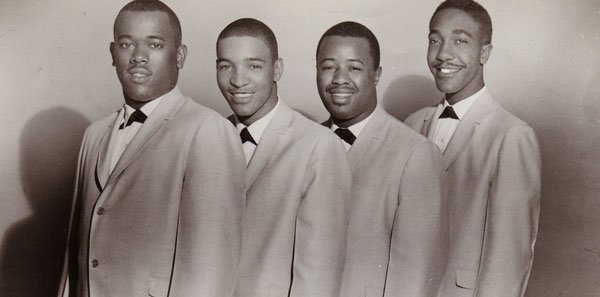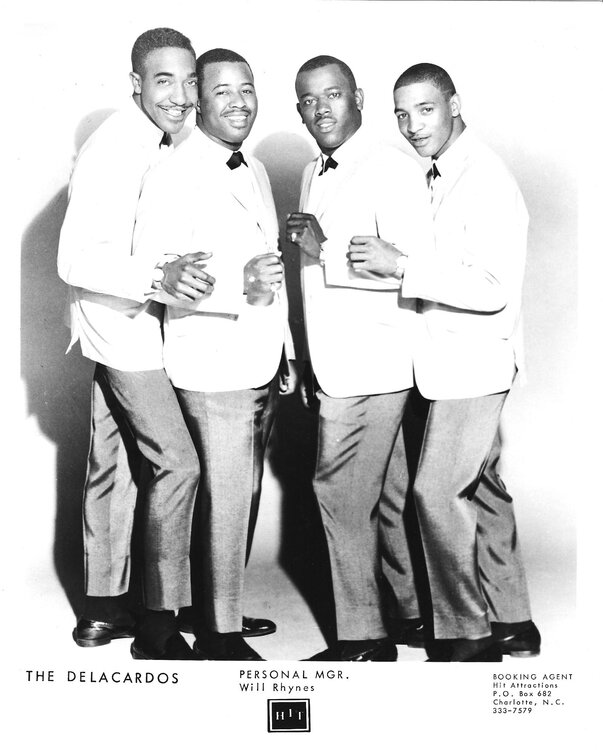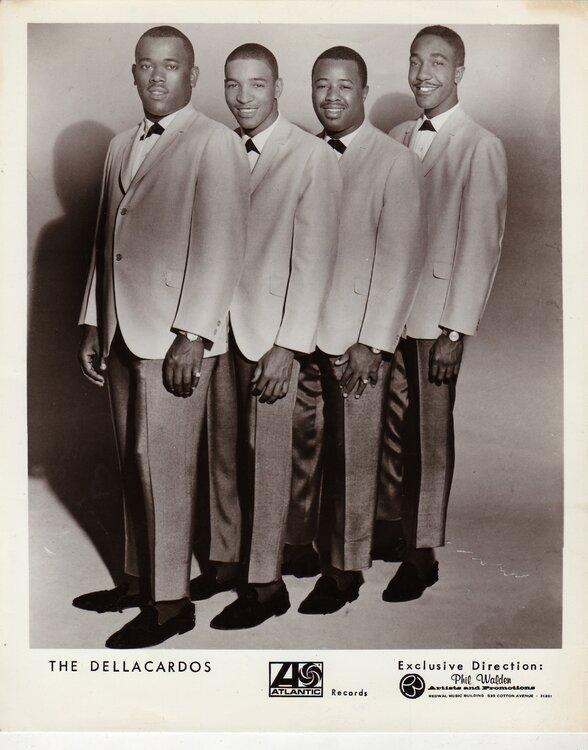The Delacardos
From the book 'It's Better to Cry' by E. Mark Windle

The Delacardos
By Mark Windle
The Delacardos were an all black vocal and instrumental group from Charlotte NC, who formed initially at high school. They made at least nine records between 1959 and 1967, some of which received national release on major labels. Vocalists were Vernon Hill, Chris Harris, Harold Ford and Robert Gates and later George Morris. Publicity shots generally featured the vocalists only, but regular musicians included Luther Maxwell (tenor saxophone and band leader), Amos Williams (guitar), Ronnie Grier (bass), Dallas Steele (drums), Timothy Donald (baritone saxophone), and on piano and guitar, Jeremiah Shepherd and James Knight. Ronnie Grier wrote most of their sides which appeared on Atlantic. The Delacardos were managed by Will Rhyne, and newspaper reports from the early sixties indicate that they were a popular live act at high schools, rock and roll revues and on the college circuit.
The group have long attracted the attention of doo-wop record collectors for their first release in 1959, “Letter to a School Girl” (Elgey 1001) and beach music enthusiasts for “Hold Back the Tears” (United Artists; UA 310), recorded two years later. For northern soul fans, there is their 1966 Q-City / Atlantic release “She’s the One I Love” (45-2368); the original version before Lee Tillman and the Secrets (a Baton Rouge, Louisiana group whose take also had plays on the UK scene). The local Q-City format is a much tougher find than the national release. A further up-tempo Atlantic release from the same year (and possibly the same session) “I Know I’m Not Much” (45-2389) has also been of longstanding interest to soul fans.
A previously unlisted demo of The Delacardos’ “Dance Gypsy Dance” (Dimension 1040) has surfaced recently via collector Bob Abrahamian. This quality early Impressions style mid-tempo dancer was written by Vernon Hill and arranged and produced by Gene Redd. Redd came from good musical stock. His father was a sax player, bandleader and A&R man for King Records, who also worked with James Brown between 1956 and 1963. Redd Jnr. was a prolific supervisor and writer and for many soul artists, many of northern interest. In the mid sixties he was part time producer along with George Kerr and George Clinton for the Jobete office in New York. Rumour has it that it was the unwanted Motown product from here which found its way onto the Stephanye label such as Roy Handy, Shirley Scott and The Prophets. Redd went on to set up his on label Red Coach in 1973 which gave us The Carstairs classic “It Really Hurts Me Girl”. This Delacardos number though is of course a much earlier affair, likely November 1964. It appears that “Dance Gypsy Dance” failed to get past the demo stage from currently available information.
The Delacardos’ pre-Atlantic recordings were made in the studio garage of Bob Richardson in Charlotte. Bob’s first successful recording as an engineer was on The Delacardos’ 1962 release “On the Beach” on Imperial. Nat Speir and his Rivieras recorded in Bob’s studio when The Delacardos were still there about a year or so later, and knew them well:
“To us white teenagers they sounded like the black groups of the late 50s to early 60s. They favoured the early Isley Brothers and sounded that way, but there was originality too. Vocally they were perfect. Their tenor lead Chris Harris had a smooth vocal and the band had a world class fiery tenor sax man, Luther Maxwell. He was my first up-close sax hero. They impressed. I think it might have been Bob Richardson who placed them with Atlantic. The Delacardos had some excellent national releases, not only “She’s the One I Love”. We became good friends early. Both bands recorded a couple of years before this one in Bob Richardson's garage studio and their drummer taught my brother about funky drumming. Luther Maxwell was the best tenor sax player around - a stylist with power and drive. He was a King Curtis type in those days but his tone was lighter. How did some of these minority guys get to be so good so young? I learned that there were two black high schools, both with most excellent legendary band directors. Black sax players received better instruction and encouragement than most whites.”
Around this time Bob Richardson was also the Mercury label south east rep. By the mid to late sixties he worked with music publisher Bill Lowery to set up a studio in an old schoolhouse in Atlanta, GA and subsequently engineered a string of hits for Billy Joe Royal, The Swinging Medallions and The Classics IV. This studio was the precursor of the famed Atlanta Mastersound studio which in the seventies and eighties was one of the most technologically advanced facility of its kind, attracting artists such as James Brown and Isaac Hayes.
Regarding The Delacardos' Atlantic tracks, Ronnie Grier confirms that “She’s the One I Love” was recorded at Arthur Smith Studios in Charlotte, NC in 1966. The lead singer on this one (and the flip) was George ‘Bubba’ Morris with Odell Grier on guitar and Ronnie Grier on bass guitar. The Q-City release was a Carolina label but credits Phil Walden and Redwal Music for publishing and distribution, as does the Atlantic release for publishing. Redwal Music was the culmination of an earlier extremely successful R&B Walden was a student at Mercer University he had set up his own company to promote Otis Redding (whom he had met a couple of years earlier) and over 40 other R&B acts. Phil and his brother Alan were determined to promote Otis as far as they could. In 1965 on the back of the success of the “Otis Blue” album, they set up Jotis Records, and with that, the Redwal production, a publishing and management arm. The Jotis label itself spawned only four releases by Arthur Conley, and two minor artists Billy Young (an army acquaintance of Phil when he was drafted for two years) and Loretta Williams, a singer who backed Otis on tour. However the activities of Redwal extended beyond Jotis, and they represented a whole host of future stars including Bobby Womack, James Carr, Clarence Carter and Tyrone Davis. Often Otis would produce and work directly with some of these artists. The Waldens already knew The Delacardos from the early sixties, when they promoted the band as a live act at a local club alongside Maurice Williams and the Zodiacs.
“In the sixties the members of The Delacardos generally drifted away or went to work or college ” says Nat Speir. “There was a story that their (original) lead singer got hard up for cash and was caught stealing a safe. I think he eventually got an early parole. Don't know what happened to most of the other guys - except for Luther. He got out of show business about 1972 or 1973. By then he was working for Western Electric. Luther took advantage of social and business changes and worked hard and moved up and up in the local office. By the late 1960s he had bought a house on Providence Road, eight to ten miles south of town in white rich folk country. He retired not long ago, a wealthy man. His children went to the best colleges and he lived in what was once an all white south Charlotte neighbourhood. Ronnie kept going musically, making recordings with his daughter at home in his studio, doing early hip hop.”
Van Coble of The Tempests reports that most of the musicians, with the exception of Amos Williams and Ronnie Grier, are now deceased. Sadly Luther Maxwell passed away during the preparation of this project.
Copyright E. Mark Windle 2013.
References
Bob Abrahamian. Personal coms. November 2012.
Van Coble. Personal coms. August, November 2012.
Ronnie Grier. Personal coms. August to November 2012.
Ted Hall. Personal coms. October, November 2012.
Nat Speir. Personal coms. July, August, November 2012.
http://www.gearslutz.com/board/so-much-gear-so-little-time/4000-rip-atlanta-studio-pioneer.html
http://swampland.com/articles/view/title:alan_walden
-
 1
1
-
 3
3





Recommended Comments
Get involved with Soul Source
Add your comments now
Join Soul Source
A free & easy soul music affair!
Join Soul Source now!Log in to Soul Source
Jump right back in!
Log in now!